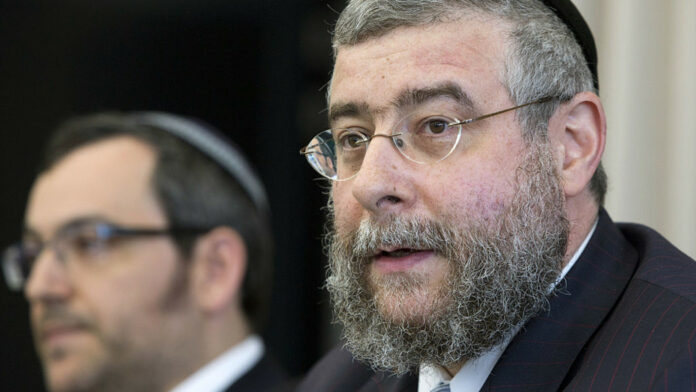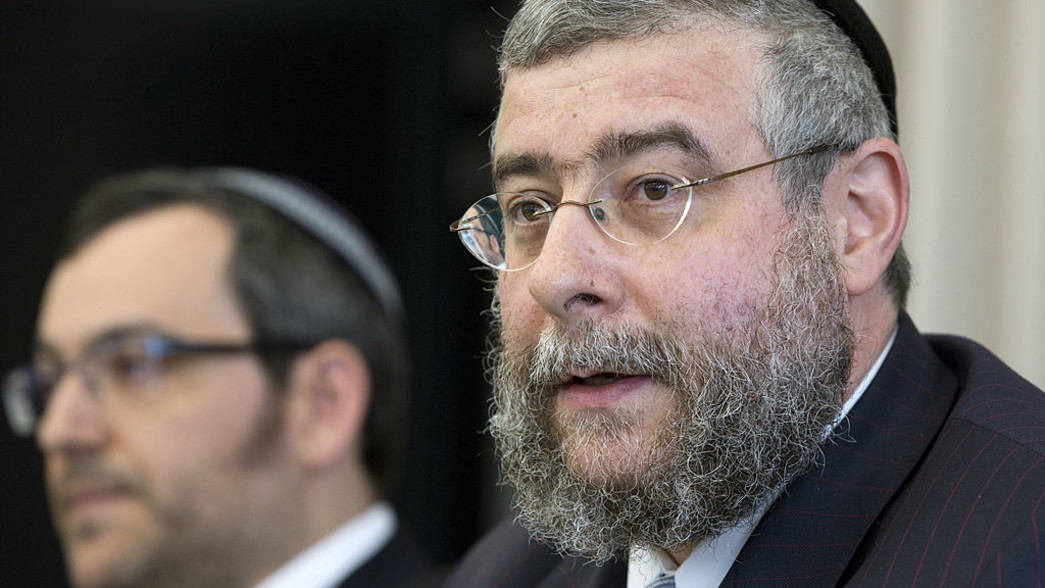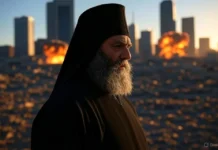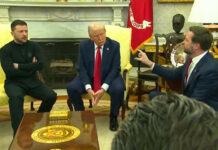From DissidentMag.
Jazzhands McFeels
In last month’s online edition of Foreign Policy magazine, an article that will be of supreme interest to many of you was published by a figure whom I have covered extensively on FTN over the years. It almost slipped completely through the cracks. One of the reasons it almost did so is because it sits behind a gargantuan $499/year paywall. Ironically, its contents are almost worth that price.
Here is the TLDR; and the basis for a forth-coming and long overdue follow-up to my “Why I Changed My Mind About Russia” article.
If I were doing this as show content, I would read the title, subtitle, and byline out loud and let them sink in. Since we’re in text form, you have to do the heavy lifting that I do so graciously for the audience each and every week.
“I Was Moscow’s Chief Rabbi. Russia Forced Me to Flee.
Putin claims he’s fighting Nazis in Ukraine while his regime intimidates Jews in Russia.
By Pinchas Goldschmidt, the Chief Rabbi of Moscow from 1993 to 2022.”
Pinchas has also called on all remaining Jews to leave Russia while they can.
Consider a few additional circumstances before diving into my quick analysis of the article. This is an article written by a Jew who was the Chief Rabbi of Moscow for almost 30 years. The audience to whom this Rabbi is writing is not a bunch of pussy-hat box wine aunts or freedom-lovin’ Fox Newsers – this subject matter is devoid of the usual finkelthink. Instead, its intended audience is the gaggle of foreign policy elites for whom $499/year is a bar tab at the Four Seasons in Georgetown after a few drinks with friends.
So this J for FPE (Foreign Policy Elites) Jazzhands, you ask? It is a legitimate genre, after all. Jews cannot allow wealthy Gentile foreign policy enjoyers to fall prey to totally unwarranted Virulent and Noxious Antisemitism™.
Before I even get into the revelations about Putin (which are fantastic and in line with what I’ve suspected), it should be noted that Pinchas Goldschmidt basically admits he arrived in Russia to accelerate the collapse of the Soviet Union.
“I arrived in Soviet Russia in 1989, as perestroika and glasnost were in full swing, to help rebuild the Jewish community destroyed by 70 years of Communist rule.”
The Soviet Union didn’t fall until 1991, so Mr. Goldschmidt seems to have been pretty prophetic in knowing when and how he would be needed to rebuild that Jewish community. Since the collective American intellect has been suppressed by Jews for decades following WWII, Pinchas feels comforted in the presumption that most people reading the article do not understand that the Soviet Union was intentionally collapsed economically by Jews and their descendants who had lost power there. International Jewry was becoming concerned that breakdowns in communism had resulted in it becoming inherently both nationalistic and anti-semitic. So for Pinchas, “rebuilding the Jewish community” is but a euphemism for destroying Soviet Russia.
This is a microcosm of the Jewish doctrine of Tikkun Olam which ostensibly means “repairing the world”. The implication of this Jewism is that the world is broken (usually by them) and, like Soviet Russia, it needs to be rebuilt. but in reality, it means forcing every aspect of the natural world to be Jewish and destroying anything that resists. As they destroy and blame the destruction on others, they create even more justification for repair. Lather. Rinse. Repeat. The weakness of pursuing such a strategy is that once a society (or in the present era, an entire planet) figures out the trickery, it comes off the rails (or perhaps on?) very quickly.
In the context of the state of post-Soviet Russia, Pinchas’ article thus serves as a eulogy for the Jewish failure to “rebuild”.
Here are the key points/revelations of the article:
1. The FSB is everywhere and has a particular interest in religious institutions as vehicles for political subversion. The FSB uses intimidation tactics to force religious workers to be informants.
2. Pinchas Goldschmidt was expelled from Russia in 2005 for refusing to be one of these informants. He points out that it is against the Jewish religion to inform on others (other Jews, not Gentiles, but predictably Pinchas doesn’t provide this detail). Berlusconi later negotiated his return. Of course, he did.
3. The Kremlin allied with the Federation of Jewish Communities of Russia (FEOR) to, as Pinchas Goldschmidt states in the article:
“act as an alibi for Putin not being an anti-semite as he destroyed and expelled 4 Jewish oligarchs Mikhail Fridman, Vladimir Gusinsky, Mikhail Khodorkovsky, Boris Berezovsky”
Berezovsky later died of alleged suicide by hanging in the U.K. Where have we heard that before?
4. When Putin announced his return to power in 2012 and protests began in earnest:
“FEOR rabbis were quick to demand that their Moscow congregants desist and not take part in the protests, upholding the general government effort of depoliticizing civil society.”
5. When Putin became more authoritarian and the West became deeply concerned:
“The heads of FEOR were dispatched to the West to convey one message: As bad as Putin is, any alternative would be worse, and Jews would be persecuted.”
6. When Putin retook Crimea, the FEOR was tasked with telling Jews to STFU and not cause any disturbances:
“FEOR leaders were at the forefront of pushing the line on social media as protests erupted from Russian Jews: Jews, don’t get involved; this is not our fight.”
7. The Museum of Tolerance, built by FEOR and centering on the narrative of World War II, was used again and again to push the line that the war against Ukraine was a war against the resurgence of Nazism. This was the line used by Rabbi Alexander Boroda, the president of FEOR, in his support of the war.
When the Allied Powers fought actual Nazis in WWII, did Jews flee Great Britain, the United States, and Russia en masse? Did Israel supply Hitler with funding and weaponry as they are now doing in Ukraine?
As to the obsessive use of the de-Nazify Ukraine meme as one of Russia’s repeated moral justifications for the conflict, and in addition to the above revelation that it’s basically a work, for those who think Putin was merely adopting the anti-White rhetoric of the global left by simply calling everyone they don’t like Nazis, this form of rhetoric does have a long-standing historical precedent in Russia.
Brief sidetrack: While researching another separate but not completely unrelated subject, I became curious about the widespread and almost religious manner in which the West will refer to the Berlin Wall as a wall that was erected by the Soviets to keep people from escaping to the green hillsides and golden streets of post-WWII. Not only is that narrative idiotic due to the geography of Berlin, but it also happens to be false.
The wall was really built to keep spies, terrorists, subversives, and CIA assets (but I repeat myself) out of East Germany. Have you ever considered what the Soviets called the Berlin Wall? Do you think they just called it that too? In fact, they didn’t. It was referred to as the Antifascistischer Schutzwall or Antifascist Bulwark and it was designed to keep the West, aka “the fascists”, out of the DDR.
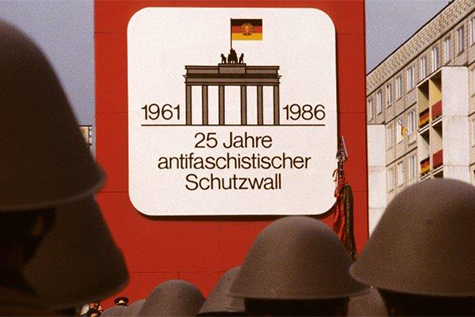
8. Those who didn’t do what the FSB wanted were expelled. More than 11 communal rabbis were deported from Russia during the last decade—namely, those who did not follow the party line established by the FSB and modeled by the Russian Orthodox Church.
The rest of the Pinchas article is a long-winded kvetch about how closely aligned the Russian Orthodox Church is with the Russian government that is interesting, but outside the scope of my commentary, which centers on understanding the real intent of Putin’s public-facing positions and rhetoric.
Since no angry Jewish diatribe can reach its conclusion without allusions to violence and death for their Gentile adversaries, Pinchas’ screed concludes with a fairly explicit warning and a threat to the Russian Orthodox Church:
“Over the last years, I have wondered why the leaders of the Russian Orthodox Church have chosen to forget the heavy price paid by their church for being completely subservient to the state at the moment of the 1917 revolution: The victorious Bolsheviks arrested thousands of priests and sent them to the gulag.”
You’ve really gotta love the chutzpah of Pinchas pretending to be a dispassionate third-party observer pointing out a parallel historical vignette in which two forces clashed and the side that won (he’s not even really quite sure if he has the name right he’s so far removed from it) did bad stuff to the losers. This totally coincidental chain of events that Jews had nothing to do with at all could happen again, goy!
One more take from this section of the article. From the Rabbi:
“All religious leaders should remember one fundamental principle: Their main asset is the people, not the cathedrals. And there is a heavy price to pay for a total merger with the state. Once the state and the church become one, one of them emerges as dangerously, ominously, superfluous.”
Where to begin with this one? For starters, hasn’t the Rabbi’s preferred relationship with Orthodox Christianity’s Western counterpart, the Roman Catholic Church, gone wonderfully for Catholics? I mean, if your main asset is the people, it’s really quite strange how church attendance and membership in the West have been in staggering decline for decades as Russia spent the past two building new cathedrals because they can’t keep up with demand. Really gets the old noggin’ joggin’.
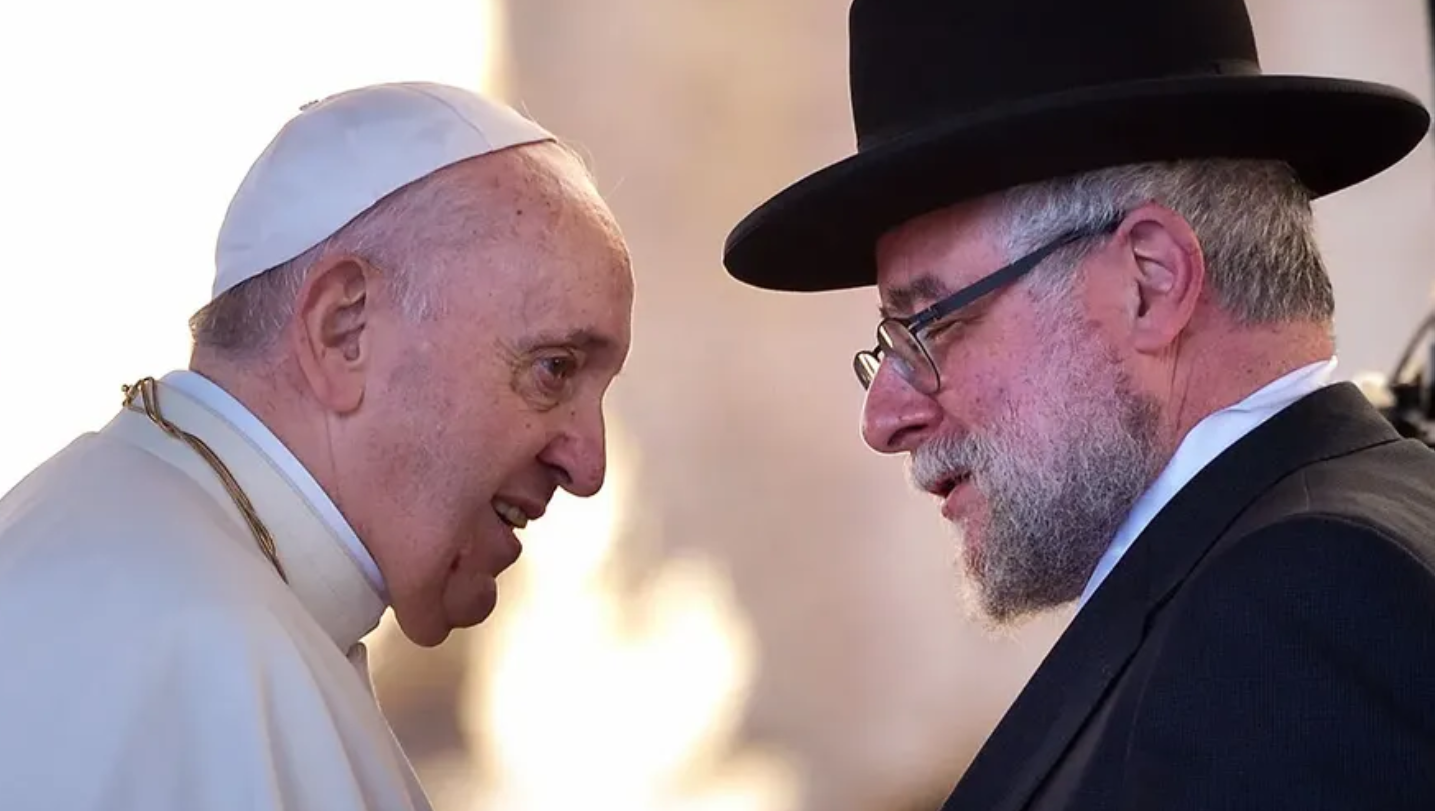
Bottom line: Pinchas seems to confirm much of what we’ve suspected all along, which is that the anti-Nazi rhetoric is an uncomfortable but effective form of propaganda being leveraged by the Russian State. Drawing on historical rhetorical precedents from the Great War, it is designed to create an alibi for prosecuting a war against the most Jewish gang of fading world powers on the planet. As a former KGB agent, Putin would have come of age in an increasingly nationalistic, anti-semitic Russia in which Jews were fleeing en masse and pushing for its collapse on the outside.
Today’s Russia under Putin is palpably nationalistic. To simultaneously believe that it somehow became less anti-semitic requires one to completely ignore the events that have unfolded since the invasion; as it is the outcomes that ultimately matter, not the rhetoric.
From DissidentMag.

